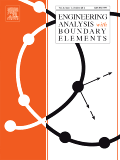
ENGINEERING ANALYSIS WITH BOUNDARY ELEMENTS
Scope & Guideline
Unveiling Insights at the Intersection of Engineering and Mathematics
Introduction
Aims and Scopes
- Boundary Element Methods (BEM):
The journal extensively covers developments and applications of BEM in various engineering disciplines, including solid mechanics, fluid dynamics, and heat transfer. - Meshless and Numerical Approaches:
It emphasizes meshless methods, such as smoothed particle hydrodynamics and radial basis function techniques, to address complex problems where traditional meshing is challenging. - Multiscale Modeling:
Research often explores multiscale approaches that integrate different modeling scales, from atomic to macroscopic, particularly in materials science and structural analysis. - Computational Mechanics and Dynamics:
Papers frequently present advancements in computational mechanics, focusing on dynamic analysis, vibration, and interaction problems in complex engineering systems. - Applications in Renewable Energy:
The journal includes studies on the application of boundary element methods in renewable energy systems, particularly in optimizing heat exchangers and solar energy systems. - Innovative Material Modeling:
Research often involves innovative approaches to modeling advanced materials, including functionally graded materials and nanocomposites, using boundary element techniques.
Trending and Emerging
- Hybrid Computational Techniques:
There is a growing trend towards hybrid methods that combine boundary element methods with finite element methods, meshless methods, and machine learning techniques to enhance accuracy and efficiency. - Machine Learning and AI Integration:
The integration of machine learning and artificial intelligence in engineering analysis is increasingly prominent, particularly in optimization and predictive modeling. - Advanced Material Modeling:
Research focusing on the behavior of advanced materials, including nanocomposites and functionally graded materials, is gaining traction, showcasing the journal's commitment to cutting-edge materials science. - Thermal and Fluid Dynamics in Renewable Energy Systems:
There is a notable increase in studies addressing thermal and fluid dynamics in renewable energy applications, reflecting the global push towards sustainable energy solutions. - Nonlinear Dynamics and Instability Analysis:
Emerging themes include the nonlinear dynamic analysis of structures and materials, particularly in relation to instability phenomena and complex loading conditions. - Environmental and Geotechnical Applications:
Research that applies boundary element methods to environmental and geotechnical problems, such as groundwater flow and soil-structure interaction, is becoming more prominent.
Declining or Waning
- Traditional Finite Element Methods (FEM):
There is a noticeable decline in papers focusing solely on traditional finite element methods, as the journal increasingly emphasizes boundary element and meshless methods. - Basic Heat Transfer Analysis:
Research centered on fundamental heat transfer analysis without integrating advanced materials or complex geometries seems to be less frequent. - Simplistic Analytical Methods:
The journal is moving away from simplistic analytical approaches in favor of more complex, computationally intensive methodologies that better reflect real-world applications.
Similar Journals
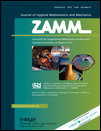
ZAMM-Zeitschrift fur Angewandte Mathematik und Mechanik
Pioneering Insights in Mathematical Applications for Engineering.ZAMM-Zeitschrift fur Angewandte Mathematik und Mechanik is a distinguished journal published by WILEY-V C H VERLAG GMBH, committed to advancing the fields of applied mathematics and computational mechanics since its inception in 1921. With a significant trajectory spanning nearly a century, this journal serves as a critical platform for the dissemination of high-quality, peer-reviewed research that encompasses theoretical and practical advancements in these disciplines. Currently holding a Q3 category in Applied Mathematics and Q2 in Computational Mechanics as per the 2023 rankings, ZAMM demonstrates its prominence with measurable impact in both fields, reflected in its Scopus rankings: 202 out of 635 journals in Applied Mathematics and 32 out of 89 in Computational Mechanics. Although it does not provide open access, ZAMM remains invaluable to researchers, professionals, and students seeking to deepen their understanding and contribute to the evolving landscape of mathematical applications in engineering contexts. Explore the latest insights and methodologies that push the boundaries of applied mathematics and mechanics by engaging with ZAMM’s comprehensive range of articles.

Vestnik Udmurtskogo Universiteta-Matematika Mekhanika Kompyuternye Nauki
Innovating solutions in computer science and fluid dynamics.Vestnik Udmurtskogo Universiteta-Matematika Mekhanika Kompyuternye Nauki is a distinguished academic journal published by Udmurt State University, based in the Russian Federation. Catering to an interdisciplinary audience, this journal spans fields such as computer science, mathematics, and fluid dynamics, with a focus on disseminating innovative research findings that contribute to the theoretical and applied aspects of these domains. As an Open Access journal, it provides researchers, professionals, and students with an unrestricted opportunity to access high-quality scientific content, promoting the exchange of knowledge and fostering collaboration. With categories ranked in the third quartile (Q3) in areas such as General Mathematics and Fluid Flow and Transfer Processes, the journal is vital for those looking to stay abreast of evolving methodologies and applications in these rapidly advancing fields. The unique positioning of this journal, serving as a platform for scholarly articles, further emphasizes its importance as a valuable resource for advancing academic discourse and research development up to the year 2024 and beyond.

JOURNAL OF ENGINEERING MATHEMATICS
Unveiling insights that shape the future of engineering.Welcome to the JOURNAL OF ENGINEERING MATHEMATICS, a leading scholarly platform published by Springer that has contributed significantly to the fields of engineering and mathematics since its inception in 1967. With an esteemed Q2 ranking in Engineering and a Q3 ranking in Mathematics according to the latest categorization, this journal is recognized for its rigorous peer-reviewed content that showcases innovative research across various mathematical and engineering disciplines. Researchers and professionals alike will find valuable insights within its pages, as it covers theoretical developments and practical applications that are pivotal for advancing knowledge in these critical areas. The journal maintains a robust presence in the global academic landscape, evidenced by its positioning in the 74th percentile for General Mathematics and 52nd percentile for General Engineering in Scopus rankings. As we look forward toward our convergence years spanning from 1967 to 2024, the JOURNAL OF ENGINEERING MATHEMATICS continues to invite submissions that foster interdisciplinary dialogue and exploration, making it an essential resource for students, academics, and industry experts.

Moscow University Mechanics Bulletin
Catalyzing Progress in Mechanical Engineering ResearchMoscow University Mechanics Bulletin, published by PLEIADES PUBLISHING INC, is a dedicated journal that has been influencing the fields of mechanical engineering and mechanics since its inception. With an ISSN of 0027-1330 and E-ISSN of 1934-8452, this journal serves as a crucial platform for advancing knowledge in mathematics, mechanical engineering, and mechanics of materials. Though currently indexed in the Q4 category across these disciplines, it offers a unique space for researchers and professionals to engage with emerging theories, experimental results, and practical applications. With a converged publication history spanning from 1973 to 1987, and continuing from 2007 to 2024, the journal remains relevant in today’s academic landscape. Though it operates under traditional access models, the journal's global reach aims to connect diverse voices in engineering research. Aspiring researchers and seasoned professionals alike will find valuable insights and a robust discourse that contribute to their respective fields.

ACTA MECHANICA
Advancing Computational Mechanics and EngineeringACTA MECHANICA, published by Springer Wien, is a reputable journal that has been an integral part of the fields of Computational Mechanics and Mechanical Engineering since its inception in 1965. With a strong emphasis on innovative research and advanced methodologies, the journal has established itself in the academic community, currently holding a distinguished Q2 ranking in both categories for 2023. The journal’s ISSN is 0001-5970, with an E-ISSN of 1619-6937. Furthermore, it proudly ranks #26 out of 89 in Computational Mechanics and #217 out of 672 in Mechanical Engineering in the Scopus database, placing it in the top percentiles of its respective fields. Researchers, professionals, and students can access cutting-edge articles that cover a wide range of topics, contributing significantly to ongoing dialogues and discoveries within mechanical disciplines. Though not an open-access journal, ACTA MECHANICA offers a platform for highly qualified researchers to disseminate their work, ensuring that significant findings advance the field's boundaries. For more information, visit the journal’s address at Prinz-Eugen-Strasse 8-10, A-1040 Vienna, AUSTRIA.

APPLIED MATHEMATICS AND MECHANICS-ENGLISH EDITION
Fostering Knowledge at the Intersection of Mathematics and MechanicsApplied Mathematics and Mechanics - English Edition is a prestigious journal published by Shanghai University, focusing on the interdisciplinary applications of mathematics and mechanics across various scientific and engineering domains. With an ISSN of 0253-4827 and an E-ISSN of 1573-2754, this journal has established itself as a vital resource since its inception in 1980, extending its coverage well into 2024. The journal boasts impressive Scopus rankings—placing it in the top 10% of the Applied Mathematics category and the top 20% in Mechanical Engineering and Mechanics of Materials—reflecting its significant impact and contribution to research. Currently categorized in the Q2 and Q1 quartiles, it caters to a diverse audience that includes researchers, professionals, and students seeking to explore cutting-edge developments and innovative methodologies in the field. Although the journal is not open access, it remains committed to disseminating high-quality research that addresses contemporary challenges in applied mathematics and mechanics, fostering a deeper understanding of their practical implications.
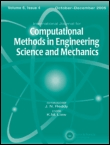
International Journal for Computational Methods in Engineering Science & Mechanics
Bridging Theory and Application in Computational MethodsThe International Journal for Computational Methods in Engineering Science & Mechanics, published by Taylor & Francis Inc., serves as a vital resource for researchers and professionals involved in the fields of computational mathematics and mechanics. With an ISSN of 1550-2287 and an E-ISSN of 1550-2295, this journal has been a cornerstone of scholarly communication since its inception in 2005 and will continue to publish cutting-edge research through 2024. Its impressive Scopus rankings highlight its impact within the field, placing it in the top quartiles for both Computational Mechanics (Q2) and Computational Mathematics (Q3), showcasing its significance for academics striving to push the boundaries of these disciplines. The journal features high-quality peer-reviewed articles that emphasize innovative computational methods, numerical analyses, and their applications in engineering science. While currently not available as an open-access option, this publication remains an essential reference for those seeking to stay at the forefront of computational methodologies in engineering practice.
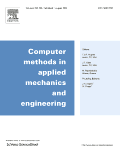
COMPUTER METHODS IN APPLIED MECHANICS AND ENGINEERING
Transforming Theoretical Insights into Practical Applications.COMPUTER METHODS IN APPLIED MECHANICS AND ENGINEERING, published by Elsevier Science SA, is a premier journal that has significantly contributed to the fields of computational mechanics, computer science applications, mechanical engineering, and the mechanics of materials since its inception in 1972. With an ISSN of 0045-7825 and an E-ISSN of 1879-2138, this journal is recognized for its rigorous peer-review process and is consistently ranked in the Q1 quartile across multiple categories, including Computational Mechanics and Mechanical Engineering. Its impressive Scopus rankings place it in the top tiers of its field, with a percentile ranking of 98th in Computational Mechanics. Researchers, professionals, and students will find the journal's comprehensive scope and high-quality articles invaluable for advancing their knowledge and practices at the intersection of engineering and computation. Although not an open-access journal, its impactful contributions to both theoretical and applied research make it an essential resource for anyone involved in these dynamic fields.
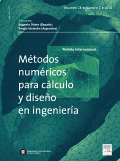
Revista Internacional de Metodos Numericos para Calculo y Diseno en Ingenieria
Elevating Engineering Design through Open Access ResearchRevista Internacional de Metodos Numericos para Calculo y Diseno en Ingenieria is a prominent academic journal dedicated to the dissemination of innovative research and methodologies in the fields of applied mathematics and engineering. Published by SCIPEDIA S L in Spain, this journal has been an essential resource for researchers since its inception in 1987, transitioning to an Open Access model in 2016 to enhance accessibility and foster collaboration among professionals and academics globally. Currently indexed in Scopus, it holds a Q4 category designation in both applied mathematics and miscellaneous engineering fields for 2023, reflecting its focus on advancing numerical methods to solve engineering problems. Despite ranking at the lower percentile, it serves as a vital platform for emerging scholars and practitioners aiming to contribute to cutting-edge developments in numerical techniques and engineering design. The journal's commitment to providing a forum for new ideas makes it an invaluable asset for students, researchers, and industry professionals seeking to stay abreast of advancements in the discipline.

Journal of Applied Mechanics and Technical Physics
Exploring the Dynamics of Material Science and EngineeringJournal of Applied Mechanics and Technical Physics is a distinguished publication that serves as a vital resource for researchers and professionals in the realms of mechanical engineering, mechanics of materials, and condensed matter physics. Published by MAIK NAUKA/INTERPERIODICA/SPRINGER, this journal has been committed to disseminating high-quality research since its inception in 1965. With a noted presence in the academic community, it holds a respectable Q3 ranking in multiple categories as of 2023, indicating its relevance and contribution to the field. Although it does not currently offer open access, the journal provides valuable insights and advancements through its rigorous peer-review process. Covering a broad spectrum of topics in applied mechanics and technical physics, it aims to foster innovation and dialogue among scientists, engineers, and scholars alike. Located in the United States, the journal continues to make significant strides in bridging the gap between theoretical research and practical applications, making it an essential read for anyone engaged in these dynamic fields.